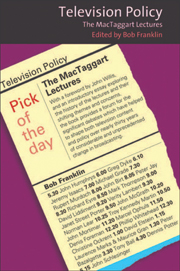Book contents
- Frontmatter
- Contents
- Acknowledgements
- Foreword
- Introduction
- The James MacTaggart Lectures
- TV Drama: The Case against Naturalism
- Naturalism and Television
- Taboos in Television
- Signposting Television in the 1980s: The Fourth Television Channel
- Television Drama, Censorship and the Truth
- The Day after Tomorrow: The Future of Electronic Publishing
- The Primacy of Programmes in the Future of Broadcasting
- Reflections on Working in Film and Television
- ‘Opening up the Fourth Front’: Micro Drama and the Rejection of Naturalism
- Power and Pluralism in Broadcasting
- Ethics, Broadcasting and Change: The French Experience
- Freedom in Broadcasting
- Deregulation and Quality Television
- The Future of Television: Market Forces and Social Values
- The Future of the BBC
- Occupying Powers
- A Culture of Dependency: Power, Politics and Broadcasters
- Talent versus Television
- A Glorious Future: Quality Broadcasting in the Digital Age
- Rewarding Creative Talent: The Struggle of the Independents
- Television versus the People
- Public-Interest Broadcasting: A New Approach
- A Time for Change
- The Soul of British Television
- Television's Creative Deficit
- Freedom of Choice: Public-Service Broadcasting and the BBC
- First Do No Harm
- Appendix A Edinburgh International Television Festival, 29 August–2 September 1977: Programme
- Appendix B Précis of Ted Turner, James MacTaggart Lecture 1982; Dr Jonathan Miller, James MacTaggart Lecture 1983
- Index
Power and Pluralism in Broadcasting
from The James MacTaggart Lectures
Published online by Cambridge University Press: 05 August 2013
- Frontmatter
- Contents
- Acknowledgements
- Foreword
- Introduction
- The James MacTaggart Lectures
- TV Drama: The Case against Naturalism
- Naturalism and Television
- Taboos in Television
- Signposting Television in the 1980s: The Fourth Television Channel
- Television Drama, Censorship and the Truth
- The Day after Tomorrow: The Future of Electronic Publishing
- The Primacy of Programmes in the Future of Broadcasting
- Reflections on Working in Film and Television
- ‘Opening up the Fourth Front’: Micro Drama and the Rejection of Naturalism
- Power and Pluralism in Broadcasting
- Ethics, Broadcasting and Change: The French Experience
- Freedom in Broadcasting
- Deregulation and Quality Television
- The Future of Television: Market Forces and Social Values
- The Future of the BBC
- Occupying Powers
- A Culture of Dependency: Power, Politics and Broadcasters
- Talent versus Television
- A Glorious Future: Quality Broadcasting in the Digital Age
- Rewarding Creative Talent: The Struggle of the Independents
- Television versus the People
- Public-Interest Broadcasting: A New Approach
- A Time for Change
- The Soul of British Television
- Television's Creative Deficit
- Freedom of Choice: Public-Service Broadcasting and the BBC
- First Do No Harm
- Appendix A Edinburgh International Television Festival, 29 August–2 September 1977: Programme
- Appendix B Précis of Ted Turner, James MacTaggart Lecture 1982; Dr Jonathan Miller, James MacTaggart Lecture 1983
- Index
Summary
Phillip Whitehead opens his lecture with the suggestion that the British broadcasting industry is suffering the most severe and sustained attack he can recall in the last twenty-five years. The assailants include politicians, government policy, new technology, free-market economics and even broadcasting regulators. The ‘buzzword’ informing policy change has been ‘choice’ measured by the number of available services. But diversity, Whitehead suggests, ‘has to be fostered’.
Whitehead argues that Annan articulated the principle of a genuine ‘regulated diversity’ promoted via different authorities protected by separate sources of finance: a smaller BBC; local radio cut ‘adrift’ from the BBC and IBA; ITV as a truly regional service and regionally based network; and a new publishing channel commissioning independent production. Ten years on, the BBC has become closer to the model Annan espoused, but the fifteen regional companies of ITV are ‘now bought and sold with little regard to their region’; the diversity of programming produced in the regions is being lost. By contrast, the independent producers have brought ‘a quite new pluralism to British television’, although this may be compromised by a ‘Peacock afterthought’ which threatens to change advertising arangements at Channel 4 and may result in a loss of ‘innovatory zest’. Similarly, ITV may be ‘dragged down’ by its investment in satellite and cable if these innovatory services fail in the late 1990s.
- Type
- Chapter
- Information
- Television PolicyThe MacTaggart Lectures, pp. 113 - 122Publisher: Edinburgh University PressPrint publication year: 2005

